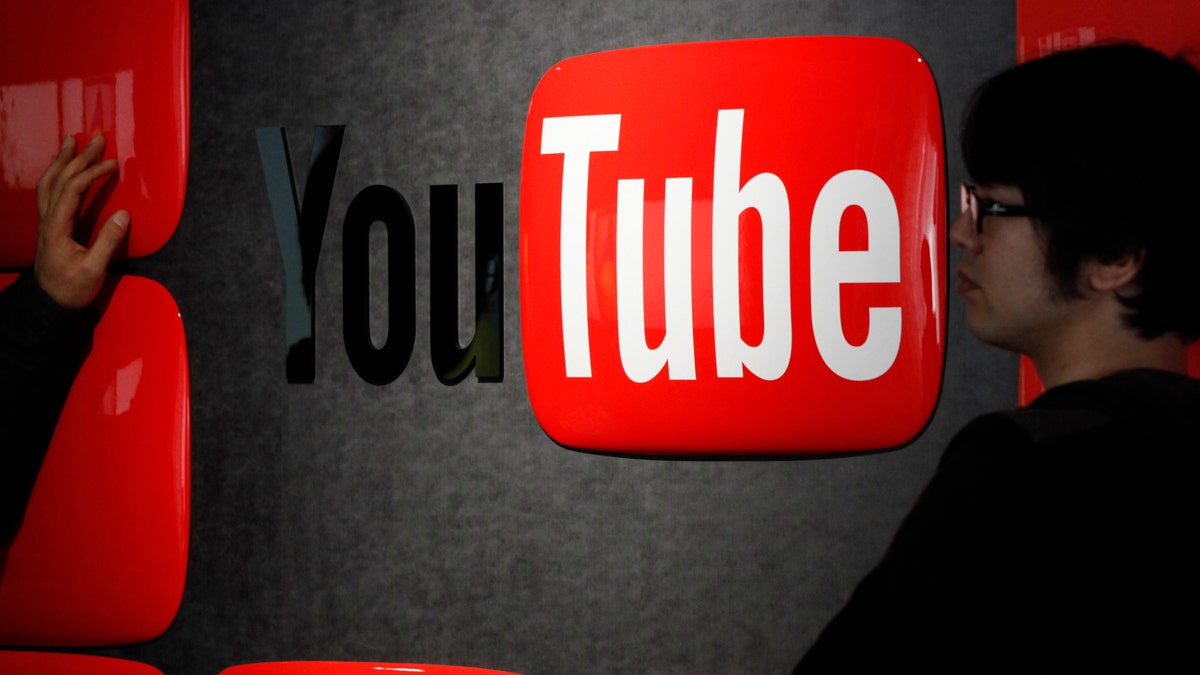
Feb. 14, 2013: Visitors stand in front of a logo of YouTube at the YouTube Space Tokyo, operated by Google, in Tokyo. (Reuters)
Democrats on the nation's top campaign finance regulator may be opening the door once again to regulating political content on the Internet, Republicans warn – despite claims to the contrary a year ago.
Federal Election Commissioner Lee Goodman told FoxNews.com that two recent decisions in particular have exposed “a deep-seated desire to regulate all forms of political speech on the Internet.”
The most recent case was considered by the FEC in June, though details were only released this month.
The case involved the Foundation for a Secure and Prosperous America (FSPA) – a conservative nonprofit that ran ads on YouTube criticizing Sen. Rand Paul’s, R-Ky., position on the Iran nuclear deal. A complaint claimed the group violated the Federal Election Campaign Act of 1971 by not filing reports disclosing its spending on videos posted primarily to YouTube.
The FEC Office of the General Counsel concluded the case should be dismissed, as the ads didn’t contain express advocacy (such as “vote for candidate X”). The counsel also noted the YouTube videos are exempt from disclosure under a pivotal 2006 FEC rule known as the Internet exemption, which says “an uncompensated individual or group ... may engage in Internet activities for the purpose of influencing a federal election without restriction.”
All FEC commissioners agreed the case should be dismissed based on the express advocacy point. But, in a significant disagreement, the commission split 3-3 along partisan lines on the question of whether YouTube videos indeed are exempt under the 2006 Internet rule.
In a statement, Democratic Commissioner Ann Ravel called for the commission to inform itself “about how political campaigns are utilizing evolving technology.”
“The Commission itself will be outmoded if it fails to study and consider these issues. Consistent with its purpose, the Commission should open its doors to hear from outside experts, technologists, activists, voters and others about modern campaigning and its opportunities,” she said. ”An effective Commission should welcome the discussion.”
This was a throwback to controversial remarks Ravel made in 2014 suggesting regulators look at extending their authority to election-themed Internet videos, saying such a “re-examination” was “long overdue.” After facing an immense public backlash, she and her colleagues then backed off the push in May 2015 and insisted they weren't pursuing Internet regulations.
Yet the FSPA case wasn't the only recent decision where Democrats allegedly cracked the door open once again to exploring the issue.
The commission also split 3-3 in a recent case that asked if the Internet exemption also exempts a webcast of a discussion with political candidates that provides a link to contribute to candidates. The Republicans said it was exempt; the Democrats disagreed.
Goodman, a Republican, said the decisions are likely to have a chilling effect on free speech.
“Political speakers who are careful about what they do, and who are advised by lawyers, may be chilled from communicating on the Internet, in the light of a 3-3 divide on the commission,” he said. “There is definitely a chilling effect.”
Neither Ravel nor the two other Democrats on the commission responded to multiple requests for comment from FoxNews.com.
Goodman said while the 3-3 split on the commission stalls any Internet regulatory push, he warned that if legislation in Congress passes to make the body a five-person body, it could give the Democrats the majority they need.
“If the commission were to be reconstituted, I believe we’re looking at full-blown regulation of political speech on the Internet,” he warned.





















